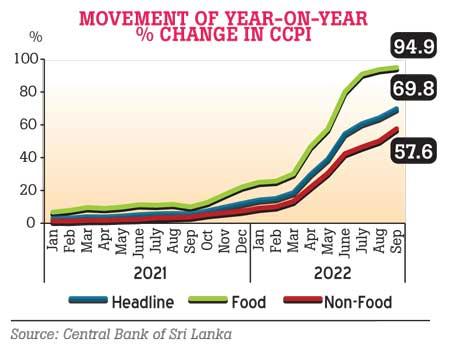Reply To:
Name - Reply Comment
Inflation in capital Colombo, as measured by the year-on-year (YoY) change in the Colombo Consumer Price Index (CCPI), rose to 69.8 percent in September, from 64.3 percent in August, as the crisis-struck nation continues to battle with exorbitant prices.
 According to the government’s statistics office, both food and non-food categories drive September’s inflation.
According to the government’s statistics office, both food and non-food categories drive September’s inflation.
Food inflation increased to 94.9 percent in September, from 93.7 percent in August while non-food inflation surged to 57.6 percent, from 50.2 percent.
Within the food category, increases were observed in the prices of fruits, chicken and wheat flour. However, the prices of rice, dhal and sugar decreased during the month.
Within the non-food category, increases were observed in the prices of housing, water, electricity, gas and other fuels (electricity bill, water bill and kerosene oil), restaurant and hotels, health, education (international school fees), communication (telephone charges) and miscellaneous goods and services sub-categories during the month.
Sri Lanka in mid-August materially hiked electricity and water tariffs to cut losses at state-owned utilities and as part of a broader reform programme to obtain an International Monetary Fund bailout package.
Sri Lanka also hiked taxes significantly to boost government revenue, overhauling the sweeping tax cuts that were introduced in late 2019, which according to many, was the root cause for the current unprecedented economic crisis.
Meanwhile, core inflation, which reflects the underlying inflation in the economy, increased to 50.2 percent in September, from 46.6 percent in August.
The Central Bank in August said Colombo inflation, the inflation gauge preferred by officials, may peak below 70 percent.